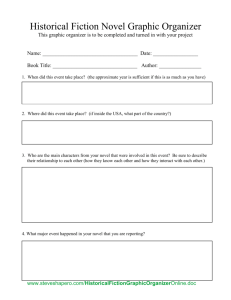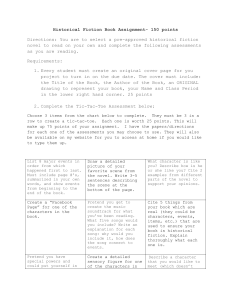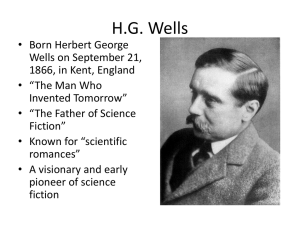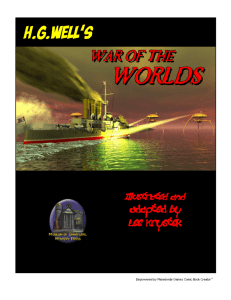smith
advertisement
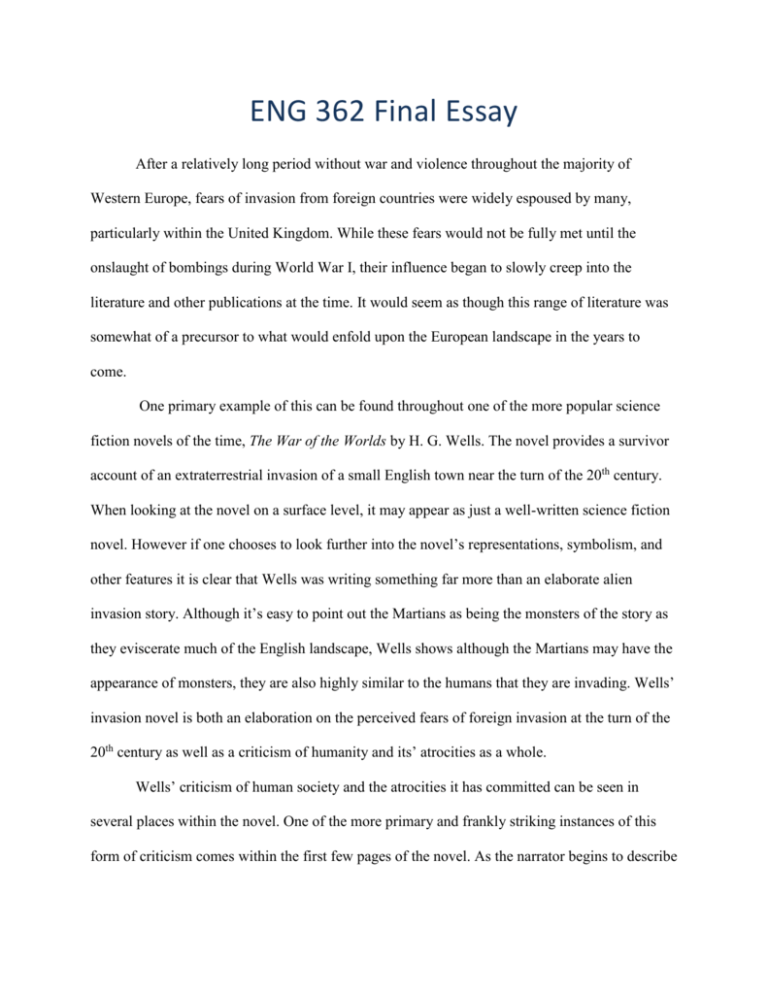
ENG 362 Final Essay After a relatively long period without war and violence throughout the majority of Western Europe, fears of invasion from foreign countries were widely espoused by many, particularly within the United Kingdom. While these fears would not be fully met until the onslaught of bombings during World War I, their influence began to slowly creep into the literature and other publications at the time. It would seem as though this range of literature was somewhat of a precursor to what would enfold upon the European landscape in the years to come. One primary example of this can be found throughout one of the more popular science fiction novels of the time, The War of the Worlds by H. G. Wells. The novel provides a survivor account of an extraterrestrial invasion of a small English town near the turn of the 20th century. When looking at the novel on a surface level, it may appear as just a well-written science fiction novel. However if one chooses to look further into the novel’s representations, symbolism, and other features it is clear that Wells was writing something far more than an elaborate alien invasion story. Although it’s easy to point out the Martians as being the monsters of the story as they eviscerate much of the English landscape, Wells shows although the Martians may have the appearance of monsters, they are also highly similar to the humans that they are invading. Wells’ invasion novel is both an elaboration on the perceived fears of foreign invasion at the turn of the 20th century as well as a criticism of humanity and its’ atrocities as a whole. Wells’ criticism of human society and the atrocities it has committed can be seen in several places within the novel. One of the more primary and frankly striking instances of this form of criticism comes within the first few pages of the novel. As the narrator begins to describe both the perceived motives and means for invasion of Earth, he stops the reader for a moment of reflection: And before we judge of them too harshly we must remember what ruthless and utter destruction our own species has wrought, not only upon animals, such as the vanished bison and the dodo, but upon its inferior races. The Tasmanians, in spite of their human likeness, were entirely swept out of existence in a war of extermination waged by European immigrants, in the space of fifty years. Are we such apostles of mercy as to complain if the Martians warred in the same spirit? (Wells 6) This particular quote provides a great deal of significance to the idea of Wells’ novel as a form of criticism of human society. The first line of the quote acts almost as a warning or precaution from the narrator to the reader. Whether they are generally aware of the novel or just through a quick glance at the summary of the back, the reader can expect to be led through an account of the Martian invasion that that havoc it wreaked during so. However this sentence cautions the reader to not judge the Martians and their violence without keeping in mind all those that humans have exterminated. In the second half of the quote’s opening sentence, the bison and dodo are given as examples of causalities as a result of human exploration however the loss of non-human life can be seen as far less damaging to the gilded image of humanity. Wells then chooses to focus his attention on the relative extermination of the native population of Tasmania. Wells’ use of this example provides an even more damaging criticism than the loss of particular animal species as he notes that despite their “human likeness” Europeans wiped the Tasmanians out of existence in a relatively short period of time. At the end of the quote the narrator further leads the reader to leave its impression open about the Martians, “Are we such apostles of Mercy as to complain mercy as to complain if the Martians warred in the same spirit?” In short, the narrator takes the pristine view of humanity and its accomplishments off of its pedestal and questions whether or not humans are any different than the Martian invaders. The quote’s significance to the rest of the novel can be seen in several different manners throughout the text. In particular the Martians can directly compare the extermination of the Tasmanian by white colonists to the attempted extermination of humans. While they may not possess the same physical likeness as the previous example, their methods of destruction and colonization have many similar attributes. In both cases, those that were being exterminated were presumably viewed as an inferior species. Just as the Martians viewed the comparably smaller and weaker humans as inferior, European immigrants viewed the native populations in the same way. It could even be noted that the later comparison reflects even worse upon the human population for the fact that they were biologically no different from each other, and yet the fear of the “other” prompted the removal of these “inferior” people. It is clear that the two forms of extermination conducted are far more similar than what the majority would appear to believe in. This comparison can be further seen in the later on in the first section of the novel. As the Martian invasion begins to unfold upon the smaller towns and villages in England, the narrator begins to ponder even further if the humans and Martians are truly any different: Or did a Martian sit within each, ruling, directing, using, much as a man's brain sits and rules in his body? I began to compare the things to human machines, to ask myself for the first time in my life how an ironclad or a steam engine would seem to an intelligent lower animal. (Wells 69) The quote draws several parallels to the comparison of Martians and humans touched upon earlier. The tripods used by the Martians in their quest for total dominance over Earth seemed like towering figures of destruction to the humans caught in their sight. The tripods moved all through the English countryside in order to rid the landscape of humans, regardless of the damage they created to the existing infrastructure and settlements. In relation to the quote, the narrator compares the towering tripod machines of the Martians to the machines of that time period. The narrator likens the experience of the humans and the tripods to how an intelligent animal would view machines such as ironclads if they were to trample through their territory. For the general reader it would seem that Wells’ rather thorough descriptions of both the aliens themselves as well as their artillery would be to show their how different to two sets of beings are from each other. However it’s clear that the overlying comparisons within their own context provides a far better argument as to their likeness as opposed to their differences. Through both the physical comparisons as well as their approach to conquering and exterminating the inferior beings, Wells’ criticism of the nature of mankind and what it has created and destroyed within its existence. Using both the general knowledge of the history of humanity and the examples provided within the novel it seems as though the author is saying that destruction and conquering is in-line with all the rest of principles. In its quest for survival and advancement throughout the ages, humans have conquered and destroyed one another in pursuit of this goal. This desire to succeed proves far more influential than almost any other trait that can be attributed to humankind. Similar to the Martian invaders, humans are seemingly bred with this trait and that two beings methods of survival and advancement, although different on the surface level, are in fact nearly identical when looked in a different light. Towards the end of the novel, the narrator has managed to stay alive throughout the destruction created by the Martians and in many ways his outlook upon the Martians as well as society in general have begun to change. While the narrator describes the Martians physical appearance as being far more different throughout much the novel, there seems to be a shift in this perspective near the end. The narrator soon begins to think that the two species have even more in common, “To me it is quite credible that the Martians may be descended from beings not unlike ourselves, by a gradual development of brain and hands (the latter giving rise to the two bunches of delicate tentacles at last) at the expense of the rest of the bod” (Wells 188). The quote clearly shows the narrators belief that the Martians were once humans or something nearly identical to humans. The quote provides another point to Wells’ criticism of humanity as the comparison of the two beings comes full circle. It can be surmised from the narrator’s thoughts that the Martians were possibly just like he is, and in their continued quest for survival evolved into a more intelligent being. And like Tasmanians being decimated by biologically, emotionally, mentally equal European immigrants, the humans were being conquered by a species that was previously identical to them. In relation to the fears of invasion that were persistent at the time of the novels publication in 1898, the comparison of Martians and Humans provides some sort of insight into these fears. Many of these fears seemed to be based upon the idea of the “other.” In historical context it was fears of Germany invading the United Kingdom and other western European countries. Although the Germans were no different biologically from the citizens within the UK, they were seen as far different. It would seem as though the long period of peace within the country had to be disrupted at some point, as if this period of calmness was an exception and not the norm. Wells’ novel directly plays upon these fears; however, he twists the national fear of some other European nation invading the country and instead uses an extraterrestrial species as the invader. While it’s classification as a pure science fiction novel is highly warranted, the deeper impacts and allegories to the invasion seems almost like a precursor to the catastrophe that would envelop the continent within the next the twenty years. When looking through the criticisms of human society provided throughout the duration of Wells’ novel it would seem that the events that would soon unfold in the early years of the 20th century would play directly into all of the criticisms that the author provided. Despite story’s fictional elements, it would seem that it was far more reflective of the mentality and nature of humanity at that time. When looking back through Well’s novel it is evident that the novel’s primary purpose was to both elaborate upon the fears of invasion by surrounding countries at the turn of the 20th century as well as provide a solid criticism of the nature and actions of humanity. For many readers it is easy to look at the novel plainly as a science fiction novel with a far greater emphasis on the science involved with a supposed Martian invasion. However when looking at Wells’ comparison of the Martian Invasion to the colonial expenditures across the globe in the previous centuries, the notion that the two species are different is severely damaged and their comparison becomes far more valid. In addition to their methods of invasion and domination, the possibility that the two may have been linked at one time increases the validity of the comparison. Wells’ novel touches upon these comparisons and brilliantly uses them to build upon the fears by the general British public at the time of the novel’s publication and yet also places the reader into a state where they must wonder whether or not this prediction of invasion and violence is anything but normal. In mankind’s pursuit of survival and advancement, the “other” is nearly always conquered even when the “other” is exactly the same as those who are conquering. Bibliography Wells, H. G. The War of the Worlds. London: Heinemann, 1898.




